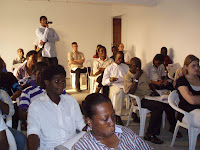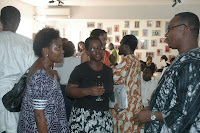LINHAIMAGINÁRIA at CCA,LAGOS. January 2009
LINHAIMAGINÁRIA
- OBALENDE’s zap zone
- BARIGA’s Moment in continuum
- YABA’s Test tube
Obalende is a commuter mini bus (“boss”) station that connects the mainland to several peripheral zones within the great Lagos city. Situated under a bridge this space of constant transit suggests that everything is on the move even the physical structures seem to be transformed every day. It seams like an organism independently working without an apparent centralized structure, in constant mutation and where the perception of time and space is fluid. Re- invented each second like zapping on a television screen in order to grasp the complexity and cultural implications of poverty zones of urban activity.
Obalende tends to reflect the global and local political implications of economic marginalisation and the subsequent absence of individual and emotional scrutiny within the world that structures poverty as an essential element of profit.

Goddy Leye during the workshop
Bariga (in Portuguese ‘Barriga’ means bailey) has been a neighbourhood confronted with youth violence. We got in touch with a group of local dancers, Crown Troup of Africa, led by Segun Adefila whose mission is to give to local youths some creative input in their lives via contemporary dance.
We had the privilege to be invited there to witness with the local people the live inauguration of Barrack Obama. We watched the broadcast on a small television and in a packed room with a lot of young people, reacting loudly to key words of Obama. Earlier in the day, we had decided with the support of the Centre of Contemporary Art, Lagos, to organize a 2 hour, public video projection in which the sound was to be delivered by huge speakers in order to grab the attention of local people. This projection started soon after the inauguration with Bill Viola’s work, Who is Bill Viola? Indeed the name was irrelevant in this context but the images certainly had an impact audience. Later on, we showed other dance videos from Mozambique, for which they felt a closer affinity. A young dancer, a member of the group was proud to wear a T-Shirt “Art saved my life” and this simply speaks for itself.
To round off this moment that we shared with this community we had a surprised public performance from our hosts - Crown Troup of Africa, in which 20 dancers performed between the lights of passing cars, motorcycles and the video projector. It was an event where all the people engaged in singing along. Moments projected within a vision in continuum. In fact, a compelling argument that artistic practice can promote social cohesion, social renewal and public interaction.


Eustaquio Neves Workshop Artists. Guest visiting CCA,Lagos during the workshop.
Yaba is the name of the neighbourhood where the Centre of Contemporary Art is located. Coming from the island along the bridge, we came across the settlement of Makoko, constructed on the lagoon waters, where a constant smoke impregnated with a specific odour from timber, waste, hipper polluted lake shores, does challenge one’s imagination and comprehension.
Makoko raises the questions of human biological resistance, the amazing mind set of engineering to make these constructions on water, and skills of merchandising timber, supplying local markets and retailers.
This community where we briefly stopped over showed us the vast complexity of identifying differences within its dislocated narrative that one can assume as a social and individual dysfunction. As we made our way deeper into the community, we saw children in schools and discovered functional structures that bother on how human beings can be creative under such adverse unimaginable environment. Yaba is a location where corporate evangelic messianic faith imported from elsewhere, is a booming business. Where the Word is money, and the lyrics promising salvation, bring tears and ecstasy, shivering bodies of joy and the conviction that next day will be better until one’s can raise more cash for the next service. The Muslim faith by contrast is silent, often seen in large public gatherings on streets, strategic urban places such as gas stations, airports, markets, and obviously the mosques.

Miguel Petchkovsky Workshop leader giving the certificate to the workshop's first prize winner Uchay Chima Joel.
Yaba is like a cinema screen only you have to sit outside, identify the frame and after some time you would have witnessed a story. The next day on the same frame the will be a different story; no wander Nigeria is the 3rd largest film producer in the world. In this ‘26hour’ city neighbourhood, The Centre of Contemporary Art could not be better located. Yaba is a test tube for creative investigation, research and inspiration that no creative mind could be indifferent about or ignore the significance of its social interfaces, multi ethnicity and academic background.The existence of the CCA, Lagos has demonstrated courage, vision and possibility. Now, it is the task of the artists and creative thinkers to respond, deliver and build a sustainable partnership with the neighbourhood by not only looking at the exterior as all have to come from within, in order to be authentic, meaningful and reclaim the emotional and public self-awareness.

Goddy Leye presenting certificate to Lucy Azubuike, workshop participant.

Eustaquio Neves and Miguel Petchkovsky giving feedback during the screening of the workshop videos to the audience.
To conceive a whole relationship with society at large, contemporary art is the scene where this re-evaluation takes place. The importance of the present art scene seems to be intimately related to the courage with which art faces reality and rediscovers that this reality is not monolithic but multiple, contradictory and problematic. Reality is often approached on a fast analysis, rather them time for observations and investigations, in which the discovering of hidden elements opens and paves the way to new interpretations often contradictory to that same reality and yes art is also problematic and contradictory that challenges audiences and questions also the creative process in order to be innovated and renewed and re- invented.
If New York is a 24hour city, Lagos is a 26 hour “Buzziness” city! The sound is one of the most prominent aspects of the city life, irritating, inspiring, surprising and on careful observation quite unique and amazing forms of communication that is far beyond formal language.

Goddy Leye with performance artist and workshop participant Jelili Atiku.
Shapes and colours on one side reveal the overwhelming scope of political neglect and provision of basic urban infrastructure to this 15 million inhabitants while on the other side, the city is a fundamental source of inspiration that is there to be critically investigated, explored and imagined.The increasingly accessibility of new generation video mobile phones, and lap top computers, proved to be an essential instruments to explore video/new media art in Nigeria. This has to be articulated within a coherent and meaningful set of strategies in close and continuous partnerships with CCA, Lagos, artists, local and regional art institutions and importantly, the support of international sponsors who are helping to construct the future development of contemporary art practices formulated around city urban spaces.

Dutch Artist Esther Polak gives a talk about the art project she is working on in Nigeria using GPS during the video workshop.

Guests from the Goethe Institute, Lagos during the video workshop reception.
The Centre of Contemporary Art in Lagos is a courageously led initiative by its director Bisi Silva and her young staff. CCA,Lagos has demonstrated pragmatic engagement in serving as a critical voice to the purpose of contemporary art development, in which artists responded to in this Workshop LINHAIMAGINÁRIA (imaginary lines). This personal commitment and desire to learn the process was demonstrated by participants who came from distant neighbourhoods such as the city of Abuja, Douala in Cameroon and for the first time, Brazil. More important than the final result of the works produced, is the process that is neither quick nor easy, in which they have to know the critical creative concepts and theories involved in the video art/new media practices, and learn to work within a group exchanging information and experiences, learn to manage individual ideas based on a critical observation in de- construction of reality, not coping reality.

Artist Lillian Pilaku talking about her video work at the final screening

Jonathan Jonas, our video editor during the workshop giving his comments during the final screening.
The task ahead, is fascinating and involves great capacity to work hard in constant experimentation and investigation. Also important is to initiate regional partnerships with individual artists and institutions. I am currently in close contact with all of the participant artists providing some degree of guidance and mentoring and a the workshop is still continue for a long time to come, in which we are trying to extend these concepts to Douala, Cameroon with some participants planning to go on their own investment and commitment to join the workshop I will give in March. I am currently working with institutions in Brazil to organize there a video workshop with the invitation of a few artists from Nigeria and Cameroon, to establish a sustained creative transit of ideas and experiences, residencies and providing exhibition platforms to make visible their works. Importantly is also the transit of Dutch artists to be in residence in Nigeria in order to learn more about the fascinating city of Lagos and teach local artists new techniques and concepts of video and new media art possibilities.
The workshop has produced a good and dynamic group, willing to communicate, to explore, to discover other cultures like Brazil, Holland and Cameroon. There are already some new artists joining the club and that is what it is all about.
The DVD of the works will be soon available and will be distributed by the CCA, Lagos.
To those who argue that Africa is poor, they do not know what they are taking about. It is now the time to harness its vast richness.
Miguel Petchkovsky
Cross section of the audience at the final video workshop screening
Cross section of the audience at the final video workshop screening.
Copy of the final video of the first workshop; The One Minute Video Workshop in October 2008














